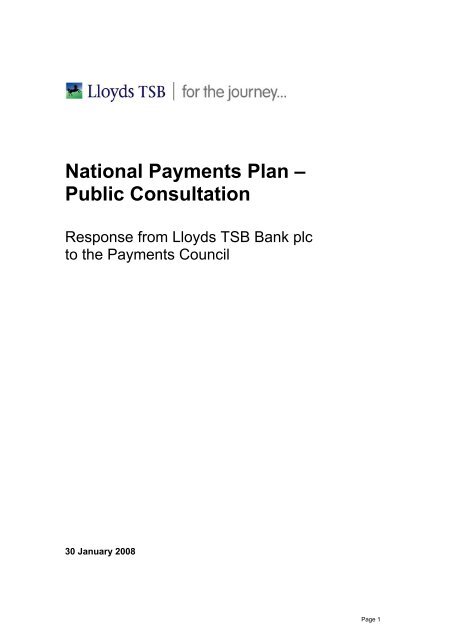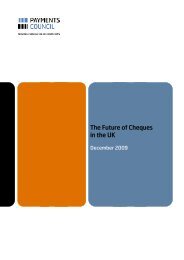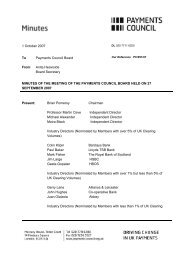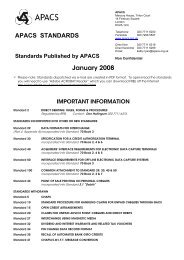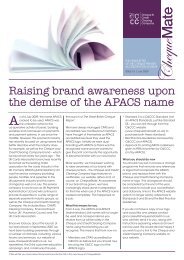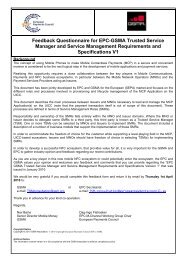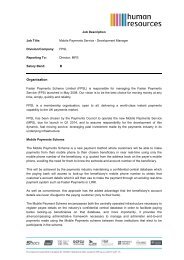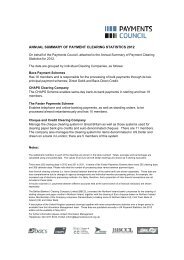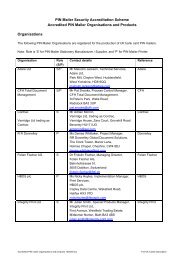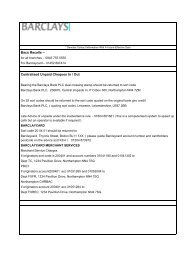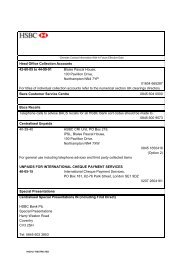Lloyds TSB Group - Payments Council
Lloyds TSB Group - Payments Council
Lloyds TSB Group - Payments Council
You also want an ePaper? Increase the reach of your titles
YUMPU automatically turns print PDFs into web optimized ePapers that Google loves.
National <strong>Payments</strong> Plan –<br />
Public Consultation<br />
Response from <strong>Lloyds</strong> <strong>TSB</strong> Bank plc<br />
to the <strong>Payments</strong> <strong>Council</strong><br />
30 January 2008<br />
Page 1
EFFICIENCY<br />
Q1 The <strong>Payments</strong> <strong>Council</strong> is minded to develop a proactive industry plan to<br />
manage what it sees as the irreversible decline in cheques. Do you agree<br />
that a plan for cheques should be developed?<br />
• Yes. A plan is essential to:<br />
o drive and accelerate changes in customer behaviour<br />
o inform on-going investment in I.T. systems and processes<br />
o support development of products and services to replace cheques<br />
o understand potential impact on all sectors’ and key interested parties<br />
Q2 For which types of payment currently made by cheque do new alternatives<br />
o need to be introduced?<br />
• Principally:<br />
o<br />
o<br />
o<br />
o<br />
person-to-business, e.g. cheques payable to schools and small business such as<br />
window cleaners, plumbers, market traders, etc.<br />
person-to-person, e.g. birthday presents, second-hand car sales.<br />
business-to-business, typically SME’s, where other aspects of cheques are valued (e.g.<br />
advance payments, cash flow control, non-financial information).<br />
business-to-person, e.g. refunds, insurance payments, etc.<br />
• Education is key to informing users of the availability and benefits of alternative methods (e.g.<br />
reconciliation of electronic payments).<br />
• Opportunity to learn from other countries that have successfully withdrawn cheques (e.g.<br />
Netherlands, Sweden).<br />
Q3 Would it be acceptable for the National <strong>Payments</strong> Plan to include a target<br />
date of 2018 for the closure of the cheque clearing (on the assumption that<br />
acceptable alternatives to cheques have been developed)?<br />
• A series of targeted dates are required to reduce usage of cheques by incremental<br />
percentages, which are more aggressive than the current natural rate of decline, e.g. 50% by<br />
2012.<br />
• Targets will help to incentivise development of alternatives, which will be necessary to change<br />
behaviours and give users viable alternatives.<br />
Q4 What sort of education of users is needed to support the migration away<br />
from cheques?<br />
• Cheque users should be educated around:<br />
o benefits of alternatives (e.g. security, speed, convenience)<br />
o cost to UK economy<br />
o environmental implications (carbon footprint)<br />
Page 2
Q5 Do you agree that, as part of the National <strong>Payments</strong> Plan, there should be<br />
an objective review of the future of the Cheque Guarantee Card Scheme?<br />
• Yes:<br />
o removing the scheme entirely would reduce the attractiveness of cheques and further<br />
accelerate their decline, whilst also helping the battle against fraud.<br />
o more retailers are declining to accept cheques and fewer cheques are being guaranteed,<br />
therefore demand for this service is declining rapidly.<br />
Q6 What other actions, if any, should there be in the National <strong>Payments</strong> Plan<br />
in relation to cheques?<br />
• To produce the business case for UK plc cheque migration.<br />
Q7 Do you agree that, as part of the National <strong>Payments</strong> Plan, there should be<br />
an objective review of the future of the paper credit clearing?<br />
• Yes<br />
o The underlying debit is not exclusively a cheque.<br />
o Paper credit clearing needs to be addressed specifically, because it could be removed<br />
before cheques have disappeared and removal could speed up the reduction in the use of<br />
cheques.<br />
Q8 The <strong>Payments</strong> <strong>Council</strong> believes that the National <strong>Payments</strong> Plan should be<br />
developed on the assumption that cash will remain a major payment<br />
method for the foreseeable future. Do you agree?<br />
• Yes, but the Plan should aim to reduce cash usage, by encouraging the use of alternatives.<br />
Q9 Should the issues of the supply and quality of notes and coin in circulation<br />
be within the scope of the National <strong>Payments</strong> Plan? If so, how should they<br />
be addressed?<br />
• No, the Plan should focus on more pressing strategic issues.<br />
Q10 What other actions, if any, should there be in the National <strong>Payments</strong> Plan<br />
in regard to cash?<br />
• Examination of ways to improve the efficiency of cash (e.g. active development of paper<br />
alternatives, reduce counterfeiting, promote cash rounding).<br />
Q11 What improvements would lead to the greater take-up of direct debits<br />
by users?<br />
•<br />
•<br />
•<br />
•<br />
•<br />
•<br />
•<br />
Faster set-up time<br />
Ability to make one-off payments<br />
Widen the eligibility to become an originator of direct debits<br />
Encourage SMEs, schools, charities, etc. to become direct debit originators.<br />
Billing companies to promote direct debits as preferred payment method, via pricing incentives<br />
and/or refusal to accept standing order or cheque payments.<br />
Improved education of consumers about the benefits of direct debits.<br />
Widen the type of account base from which direct debits can be made (align direct debits and<br />
recurring card payment models).<br />
Page 3
Q12 Would you support the introduction of a time-limited guarantee for direct<br />
debits in place of the current unlimited guarantee?<br />
• Yes, provided:<br />
o this is supported by the results of customer research<br />
o the costs / benefits / implications are fully understood and accepted<br />
It would seem strange that the UK is not aligned with Europe, however they have not necessarily<br />
achieved the correct balance between consumer, originator and sponsoring bank risk, in that 6<br />
weeks is probably too short.<br />
Q13 If so, what time limit do you think would be appropriate?<br />
• 12 months, aligned with warranty on goods.<br />
Q14 What measures to improve the accuracy and end-to-end delivery of<br />
reference information, with internet and telephone banking payments<br />
and with other direct credits, could usefully be introduced?<br />
• Standardisation of reference data to improve / enable reconciliation by the beneficiary, which<br />
would require significant investment spend to change systems across a range of stakeholders.<br />
• Customer education to provide the required reference data in the correct format.<br />
• This current issue is perceived as a real obstacle to migrating businesses away from both<br />
cheques and the issuance of paper invoices, and would be a significant enabler for e-invoicing.<br />
Q15 Are there any other enhancements you think should be made to direct<br />
credits?<br />
• No, the UK is already addressing this issue via the introduction of Faster <strong>Payments</strong>.<br />
Q16 What opportunities would you identify to exploit the ATM infrastructure<br />
for non-cash transactions? How should these be reflected in the National<br />
<strong>Payments</strong> Plan?<br />
• Specific non-cash developments on ATMs are a commercial matter for individual providers.<br />
Q17 Which other, if any, actions should there be in the National <strong>Payments</strong> Plan<br />
in relation to credit and debit cards and cash machines?<br />
• No.<br />
Q18 What improvements should be made to the way in which payments in the<br />
wholesale markets are carried out?<br />
• <strong>Payments</strong> <strong>Council</strong> should encourage collaborative efforts across the industry to would improve<br />
the efficiency of wholesale transactions.<br />
Page 4
Q19 What should the <strong>Payments</strong> <strong>Council</strong> do to ensure that users in the UK can<br />
take best advantage of SEPA?<br />
• Endorse the concept of SEPA and minimize the impact on UK plc.<br />
Q20 What issues does SEPA raise for your use of payments?<br />
• Introduction of the PSD into UK law in 2009 will affect both Sterling and Euro payments.<br />
• Therefore, SEPA will create a third infrastructure for UK banks: domestic, ‘foreign’ and<br />
European payments, which is a significant overhead, not just for banks but also the corporate<br />
market.<br />
• <strong>Payments</strong> <strong>Council</strong> has a key role to play in protecting the interests of the UK, by briefing and<br />
informing HMT and UK regulators.<br />
Q21 What improvements should be made to cross-border payments?<br />
• We understand cross-border payments to mean worldwide:<br />
o Standardisation<br />
o Global schemes and rules<br />
o International infrastructures<br />
Q22 What measures to enhance users’ efficiency should be considered by the<br />
<strong>Payments</strong> <strong>Council</strong>?<br />
• SEPA already requires financial services providers and customers to provide account<br />
information using BIC and IBAN.<br />
• This has involved significant initial investment for financial services providers, but will underpin<br />
simplification of infrastructure and processes, leading to longer-term cost savings.<br />
Page 5
INNOVATION<br />
Q23 Do you agree that at the present stage of market development the<br />
contactless and prepaid card sectors are best left to initiatives from individual<br />
payment service providers and the card schemes?<br />
• Yes.<br />
Q24 What support, if any, could the National <strong>Payments</strong> Plan offer to the<br />
development of contactless cards? In particular, is further action needed<br />
to ensure that the standards for contactless cards meet the needs of all<br />
sectors of users?<br />
•<br />
•<br />
•<br />
Development of common standards for technology infrastructure and systems.<br />
Development of customer protection, via disputes and chargeback procedures.<br />
Education and communication to influence customer behaviour to use contactless technology.<br />
Q25 What support, if any, can the National <strong>Payments</strong> Plan offer to the<br />
development of prepaid cards?<br />
•<br />
•<br />
•<br />
Development of common standards for technology infrastructure and systems.<br />
Development of customer protection, via disputes and chargeback procedures.<br />
Education and communication to influence customer behaviour to use pre-paid technology.<br />
Q26 What role should the <strong>Payments</strong> <strong>Council</strong> play in the development of mobile<br />
payment services, including setting the standards for mobile payments?<br />
•<br />
•<br />
•<br />
Development of common standards for technology infrastructure and systems.<br />
Development of customer protection, via disputes and chargeback procedures, and actions<br />
initiatives to reduce fraud.<br />
Education and communication to influence customer behaviour to use mobile technology.<br />
Q27 In particular, do you agree that the National <strong>Payments</strong> Plan should support<br />
the development of mobile payment services between bank accounts?<br />
• Yes. This covers the collaborative space and is an opportunity for NPP to promote the wider<br />
benefits to customers and providers of mobile payments, e.g. convenience, speed and<br />
efficiency.<br />
Q28 What principal characteristics would users find attractive in a mobile<br />
payment service?<br />
• Convenience, ease of use, near real time confirmation of receipt of funds, security of<br />
transaction, alignment with pre-paid / contactless payments, added-value services (e.g. over<br />
the air top-up).<br />
Q29 What role do mobile phone payments potentially play in providing<br />
alternatives to traditional forms of payment?<br />
•<br />
•<br />
Replacement of traditional payment methods, with increased functionality and benefits.<br />
Opportunity for interactivity with customers<br />
Page 6
Q30 What other actions, if any, should there be in the National <strong>Payments</strong> Plan<br />
in regard to mobile payments?<br />
• None.<br />
Q31 Do you agree that the <strong>Payments</strong> <strong>Council</strong> should indicate support for the<br />
work of the European Commission Steering Committee on e-invoicing and<br />
associated activity, including the development of international standards<br />
that facilitate supply chain efficiency?<br />
• Yes.<br />
• European and UK developments are closely mirrored, therefore <strong>Payments</strong> <strong>Council</strong> should<br />
ensure that the UK position is promoted and protected and also aligned with global<br />
developments.<br />
Q32 What role should the National <strong>Payments</strong> Plan play in moving this<br />
agenda forward?<br />
• An active role in supporting and promoting the interests of the UK, with clear governance<br />
direction as to how we should interact with Europe and the rest of the world.<br />
Q33 What other actions should be included in the National <strong>Payments</strong> Plan?<br />
• All aspects of the supply chain should be considered, on an end-to-end basis, including<br />
consumers, suppliers and other stakeholders.<br />
• Support for scheme governance review, which is seen as key to enabling delivery of the plan.<br />
Q34 What other payment innovations requiring action at industry level should<br />
be considered by the <strong>Payments</strong> <strong>Council</strong>?<br />
• Development and promotion of improved Fraud Prevention measures, as these form part of<br />
the collaborative industry space.<br />
• Micro payments should be also considered.<br />
Page 7
OTHER ISSUES – EDUCATION<br />
Q35 What gaps are there in current financial educational initiatives in regard to<br />
payment matters?<br />
•<br />
•<br />
Financially-excluded, schools / youth market, immigrants.<br />
Financial security – what consumers should / should not be concerned about, and how they<br />
can protect their money.<br />
Q36 What role can the <strong>Payments</strong> <strong>Council</strong> play in promoting the education of<br />
consumers about the choice of payment methods available to them?<br />
What other bodies should it work with to deliver this role?<br />
• <strong>Payments</strong> <strong>Council</strong> can, and should, play a key leadership role.<br />
It’s credibility will be strong, as it is able to present an impartial view due to the presence of<br />
non-financial representatives amongst its membership.<br />
• Other bodies to work with: media, government, consumer groups and independent advisors<br />
(e.g. Consumers Association, Citizens’ Advice Bureau).<br />
Q37 What role can the <strong>Payments</strong> <strong>Council</strong> play in promoting financial inclusion?<br />
• See answers to questions 35 and 36.<br />
Q38 What other bodies should it work with to deliver this role?<br />
• Media, government, consumer groups and independent advisors.<br />
• Accountability needs to be clearly defined and understood, otherwise there is a risk that each<br />
body assumes that another is taking the action.<br />
OTHER ISSUES – FRAUD<br />
Q39 What are the main challenges to the integrity of payment systems that<br />
need to be addressed collaboratively?<br />
• Security of data<br />
• Protection against fraud<br />
• Robustness and resilience (i.e. UK-wide planning similar to that for avian flu to mitigate impact<br />
against attacks on payments systems from terrorism, etc.)<br />
Q40 How should consideration of measures against fraud be included in the<br />
assessments which the <strong>Payments</strong> <strong>Council</strong> makes of proposals for<br />
innovation?<br />
• <strong>Payments</strong> <strong>Council</strong> should ensure that new developments have adequate fraud countermeasures,<br />
so that payments are not brought into disrepute.<br />
• <strong>Payments</strong> <strong>Council</strong> should set minimum standards, but not be prescriptive about how they are<br />
achieved, so leaving payments services providers to chose and offer more as part of a<br />
competitive offering.<br />
Page 8
Q41 How can the National <strong>Payments</strong> Plan assist with issues of customer<br />
authentication? To what extent do these need to be addressed across the<br />
payments sector?<br />
• Promote minimum standards of authentication, for each channel / access mechanism, since<br />
any successful attack on one bank will damage the reputation of the entire industry.<br />
• Address customer authentication as part of a collaborative approach across the industry,<br />
although individual banks may set specific parameters for individual transactions and/or types<br />
of payment<br />
• Help to unlock access to data (e.g. electoral roll) which may enable banks to extend their<br />
financial services offering to a wider market, e.g. financially-excluded.<br />
Q42 Should minimum standards be introduced for authentication of remote<br />
transactions? If so, should a common measure of authentication be<br />
recommended/mandated?<br />
• Yes.<br />
• Yes. A pre-requisite will be collaboration across the financial industry and with major computer<br />
manufacturers, telephone companies, etc.<br />
Q43 How should the National <strong>Payments</strong> Plan address new technologies, such as<br />
biometrics, which may contribute to customer security?<br />
• Adopt an independent role, but support new developments by providing research, guidance<br />
and opportunity for collaborative industry-wide discussion in the non-competitive space.<br />
• Encourage use of consistent language and terminology.<br />
• Help overcome any legislative barriers that are inhibiting developments.<br />
• Education on benefits.<br />
Q44 What actions, if any, should the National <strong>Payments</strong> Plan include in regard<br />
to data sharing?<br />
• The industry is already covered by existing regulation (e.g. Data Protection Act, Banking<br />
Code), however the NPP can promote discussion of improved standards and risk controls<br />
across the collaborative space.<br />
• Help to unlock access to data (e.g. electoral roll) which may enable banks to extend their<br />
financial services offering to a wider market, e.g. financially-excluded.<br />
• Understand the obstacles to data-sharing and encourage increased collaboration.<br />
Q45 How can the National <strong>Payments</strong> Plan help ensure that the burden of fraud<br />
prevention is shared equitably across payment service providers and users,<br />
including SMEs?<br />
• Payment Services Directive already states clearly who will pay for the cost of fraud incidents.<br />
• <strong>Payments</strong> <strong>Council</strong> should play a role in improving education of consumers, merchants, etc.<br />
(i.e. all parties in the chain) as to how they can prevent / better protect against fraud.<br />
Page 9
Q46 What role should the <strong>Payments</strong> <strong>Council</strong> play in raising the profile of fraud<br />
and security issues and in lobbying government and the public authorities?<br />
• See response to question 45.<br />
Q47 What should be the role of standards in the National <strong>Payments</strong> Plan?<br />
Are the current principles as agreed by the Board a suitable base from<br />
which to start? What role should the <strong>Payments</strong> <strong>Council</strong> play in influencing<br />
international standards developments?<br />
• <strong>Payments</strong> <strong>Council</strong> should:<br />
o<br />
o<br />
o<br />
adopt an holistic view to reflect the interests of all stakeholders.<br />
ensure that the UK has plans in place to support and adopt, where possible, single<br />
international standards for both its domestic and cross border payment processing.<br />
understand the end-to-end impact that development of international standards have on<br />
current domestic standards, especially on banks’ and customers’ payment and accounting<br />
systems (e.g. SEPA has used the new international standard ISO 20022; this is based on<br />
the E2E transaction chain, which creates far more fields and field sizes than in legacy<br />
domestic standards like Standards 18, thus impacting interoperability).<br />
Q48 What, in particular, should the National <strong>Payments</strong> Plan say about<br />
messaging standards?<br />
• NPP should consider advocate the use of ISO 20022 for all message communications, which<br />
already encompasses end-to-end processes.<br />
• However, this should not be made mandatory, as this would incur significant costs to the<br />
accounting systems of financial institutions and corporates.<br />
OTHER ISSUES – COSTS<br />
Q49 Would you support an initiative, led by the <strong>Payments</strong> <strong>Council</strong>, to establish a<br />
better understanding of the costs of UK payments? If so, how do you think<br />
this should be taken forward? What supporting information do you think<br />
would be relevant for such an exercise?<br />
• No, due to questionable benefit and the cost/difficulty of doing so. Costs analysis is already<br />
undertaken as part of individual business case development.<br />
• <strong>Payments</strong> <strong>Council</strong> should educate consumers as to the value that Financial Institutions bring to<br />
the UK economy and their importance as part of the UK national infrastructure; focusing on<br />
‘costs’ would detract from the importance of getting this across.<br />
______________________________________________________________________________<br />
•<br />
Page 10


